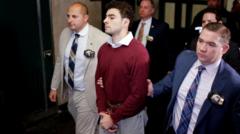In a highly publicized court appearance in New York, 26-year-old Luigi Mangione essentially denied involvement in the shooting death of UnitedHealthCare CEO Brian Thompson. Charged with 11 state criminal counts, including first-degree murder and acts of terrorism, Mangione faces severe penalties that could result in life imprisonment or even the death penalty under federal charges.
Authorities allege that Mangione shot Thompson in Manhattan before fleeing and subsequently being apprehended at a McDonald's in Pennsylvania. During his Monday court appearance, Mangione presented a solemn demeanor, attired in a maroon sweater, collared shirt, and khaki trousers, as crowds of journalists and supportive members of the public filled the courtroom.
In the complex legal landscape ahead, Mangione's defense lawyer, Karen Friedman Agnifilo, highlighted concerns over the significant overlap and contradiction between state and federal charges. The state’s allegations frame the murder as a politically motivated act, while federal charges focus solely on the individual victim, emphasizing the defendants’ potential right to a fair trial.
Commenting on the unusual nature of the legal proceedings, Agnifilo remarked on the myriad challenges confronted in representing Mangione, including the way he has been treated in the media and by the authorities. She pointed out that the case was becoming politicized, which jeopardizes the integrity of the judicial process. In response, the presiding judge, Gregory Carro, affirmed the court's commitment to ensuring a fair trial despite the surrounding chaos.
Evidence suggests that Mangione’s actions were driven by discontent with the U.S. healthcare system, as a notebook recovered from him showcased his grievances against healthcare executives. Some public reactions have been mixed, with social media commentators even expressing support for Mangione's alleged motives, further complicating the narrative surrounding the crime.
Homeland Security Secretary Alejandro Mayorkas expressed alarm at the shift in public sentiment towards violence, which he noted is increasingly influenced by domestic extremist rhetoric. He underscored the pressing need for society to address the underlying frustrations fueling such acts.
As Mangione prepares for what promises to be a complex legal battle, both state and federal prosecutors are gearing up to present their cases. The intertwining dynamics of this high-profile case will likely unfold in the months to come, shedding light on broader societal issues related to healthcare and violence in America.
Authorities allege that Mangione shot Thompson in Manhattan before fleeing and subsequently being apprehended at a McDonald's in Pennsylvania. During his Monday court appearance, Mangione presented a solemn demeanor, attired in a maroon sweater, collared shirt, and khaki trousers, as crowds of journalists and supportive members of the public filled the courtroom.
In the complex legal landscape ahead, Mangione's defense lawyer, Karen Friedman Agnifilo, highlighted concerns over the significant overlap and contradiction between state and federal charges. The state’s allegations frame the murder as a politically motivated act, while federal charges focus solely on the individual victim, emphasizing the defendants’ potential right to a fair trial.
Commenting on the unusual nature of the legal proceedings, Agnifilo remarked on the myriad challenges confronted in representing Mangione, including the way he has been treated in the media and by the authorities. She pointed out that the case was becoming politicized, which jeopardizes the integrity of the judicial process. In response, the presiding judge, Gregory Carro, affirmed the court's commitment to ensuring a fair trial despite the surrounding chaos.
Evidence suggests that Mangione’s actions were driven by discontent with the U.S. healthcare system, as a notebook recovered from him showcased his grievances against healthcare executives. Some public reactions have been mixed, with social media commentators even expressing support for Mangione's alleged motives, further complicating the narrative surrounding the crime.
Homeland Security Secretary Alejandro Mayorkas expressed alarm at the shift in public sentiment towards violence, which he noted is increasingly influenced by domestic extremist rhetoric. He underscored the pressing need for society to address the underlying frustrations fueling such acts.
As Mangione prepares for what promises to be a complex legal battle, both state and federal prosecutors are gearing up to present their cases. The intertwining dynamics of this high-profile case will likely unfold in the months to come, shedding light on broader societal issues related to healthcare and violence in America.





















